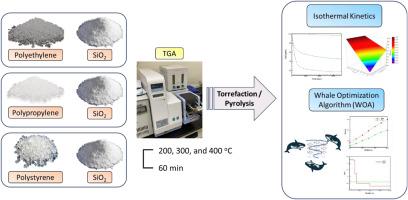Thermochemical conversion of microplastics: Kinetics refining via whale optimization algorithm for energy applications
IF 9.4
1区 工程技术
Q1 ENERGY & FUELS
引用次数: 0
Abstract
Microplastics, while persistent environmental pollutants, also constitute an energy-rich feedstock suitable for thermochemical conversion. This study introduces the first application of the whale optimization algorithm (WOA) to model isothermal thermodegradation kinetics of polyethylene (PE), polypropylene (PP), and polystyrene (PS) using thermogravimetric analysis. A two-step reaction model optimized by WOA achieved high fit qualities of 99.75 %, 98.93 %, and 99.97 % for PE, PP, and PS, respectively, with activation energy ranges of 14.97–85.24, 68.49–95.92, and 47.99–103.58 kJ mol−1. The integration of an inert dispersant such as SiO2 improved heat transfer uniformity, enhancing the accuracy of kinetic parameter estimation. These parameters enable the design of energy-optimized torrefaction and pyrolysis systems capable of achieving over 70 % weight loss at 400 °C, maximizing volatile yields for fuel production. Compared with particle swarm optimization, WOA demonstrated superior accuracy and convergence stability, highlighting its potential for modeling complex degradation processes. The results provide a robust computational framework for scaling waste-to-energy applications, supporting both energy recovery and circular economy objectives in plastic waste management.

微塑料的热化学转化:通过鲸鱼优化算法进行能量应用的动力学精炼
微塑料虽然是持久的环境污染物,但也构成了适合热化学转化的高能量原料。本研究首次应用鲸鱼优化算法(WOA)对聚乙烯(PE)、聚丙烯(PP)和聚苯乙烯(PS)的等温热降解动力学进行热重分析。WOA优化的两步反应模型对PE、PP和PS的拟合率分别为99.75%、98.93%和99.97%,活化能范围分别为14.97 ~ 85.24、68.49 ~ 95.92和47.99 ~ 103.58 kJ mol−1。SiO2等惰性分散剂的集成改善了传热均匀性,提高了动力学参数估计的准确性。这些参数使能量优化的焙烧和热解系统能够在400°C下实现70%以上的失重,最大限度地提高燃料生产的挥发性产量。与粒子群算法相比,WOA算法具有更好的精度和收敛稳定性,突出了其在复杂降解过程建模方面的潜力。研究结果为扩大废物转化为能源的应用提供了一个强大的计算框架,支持塑料废物管理中的能源回收和循环经济目标。
本文章由计算机程序翻译,如有差异,请以英文原文为准。
求助全文
约1分钟内获得全文
求助全文
来源期刊

Energy
工程技术-能源与燃料
CiteScore
15.30
自引率
14.40%
发文量
0
审稿时长
14.2 weeks
期刊介绍:
Energy is a multidisciplinary, international journal that publishes research and analysis in the field of energy engineering. Our aim is to become a leading peer-reviewed platform and a trusted source of information for energy-related topics.
The journal covers a range of areas including mechanical engineering, thermal sciences, and energy analysis. We are particularly interested in research on energy modelling, prediction, integrated energy systems, planning, and management.
Additionally, we welcome papers on energy conservation, efficiency, biomass and bioenergy, renewable energy, electricity supply and demand, energy storage, buildings, and economic and policy issues. These topics should align with our broader multidisciplinary focus.
 求助内容:
求助内容: 应助结果提醒方式:
应助结果提醒方式:


